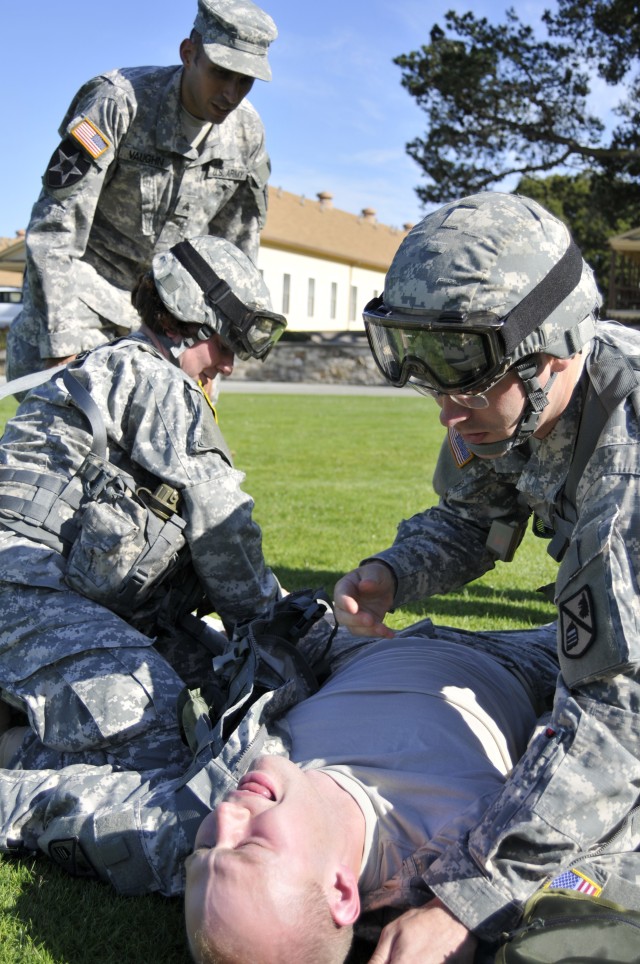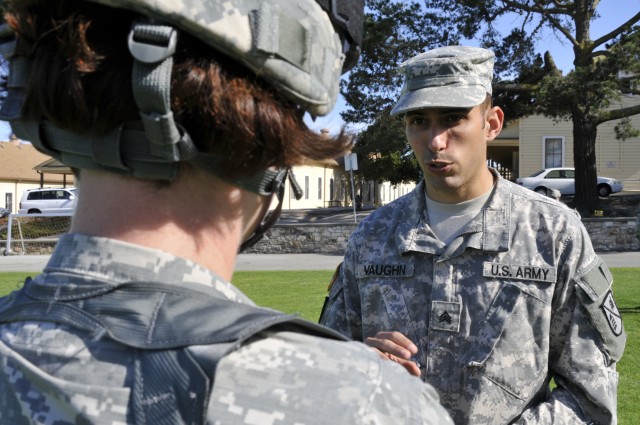PRESIDIO OF MONTEREY, Calif. - Sergeant's time training (STT) is a period in which squad leaders get the opportunity to work on unit tasks that Soldiers need to accomplish their mission. This time (usually every Thursday morning) became a requirement and resource for Soldiers to use to assess their weaknesses and improve upon them to become a more cohesive unit or team. However, for Defense Language Institute Foreign Language Center students, STT is not readily available due to the long classroom hours with the added challenge of learning another language and getting past the arguably difficult Defense Language Aptitude Test 5 to qualify for their target language. "I know that I pitched bringing back (STT) to the students here," said Sgt. Edward Vaughn, a squad leader with D Co. 229th Military Intelligence Battalion. Vaughn was initially shut down after his first pitch because of the aforementioned training that students here must pass to get to the next stage of their training in their MI careers. "So I ran into some difficulty, but I thought (STT) was great tool that these students just coming out of basic training could use," said Vaughn. This caused Vaughn to create a training plan, have the training within the company make it voluntary to Soldiers in his company that wanted to learn from Vaughn and other experienced non-commissioned officers in his unit. "So we got the go-ahead from our commander and first sergeant and committed to an eight-week training (plan) that would incorporate practical (warrior) tasks that these Soldiers would need on the battlefield, he said. Tasks include radio communication, weapons familiarization, combatives and first aid. "These are all vitally important to know on the battlefield," said Vaughn, who served a 15-month tour in Iraq prior to coming back to DLI as a language student. Vaughn also felt that the quarterly military training days that the 229th Military Intelligence Battalion, though exciting and useful, was not enough for his Soldiers who may have to deploy sooner rather than later. "They could go on deployments in possibly three weeks (of their reporting) to their units," said Vaughn. Spc. Ann Porogi, D Co. 229th Military Intelligence Battalion had completed her third week of training and said that the benefit of the training has made taking the extra time out of her schedule worthwhile. "It is incredibly helpful, practical knowledge," said Porogi of the course. "To get to cover knowledge that we don't usually get formerly trained on has been useful," she added. The program has been very well received from IET Soldiers like Porogi and Vaughn hopes that the program would carry on after he has graduated from his course. "I want to at least get the Soldiers that volunteer for the training certificates of achievement and hopefully from this build a better program so that these Soldiers can prepare for what's ahead," said Vaughn. Vaughn also attributes his success with the program from the support of his fellow NCOs and his leadership. "We have got good resources and the leadership is behind it," said Vaughn. "We just need to build up the spirit to continue to do this. If for anything else, to remind them that they're Soldiers."
A sergeant's time
By Hiro Chang Presidio of Monterey Puiblic AffairsJune 10, 2009




Social Sharing